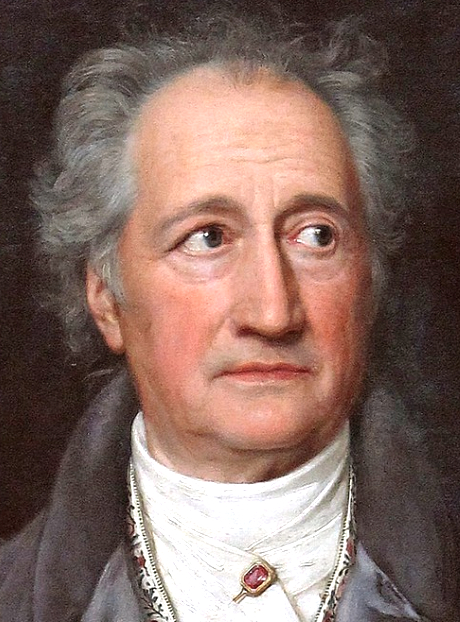On this date in 1749, Germany’s most famous poet, Johann Wolfgang von Goethe, was born in Frankfurt am Main, to a comfortable bourgeois family. He began studying law at Leipzig University at the age of 16 and practiced law briefly before devoting most of his life to writing poetry, plays and novels. In 1773, Goethe wrote the powerful poem “Prometheus,” which urged human beings to believe in themselves more than in gods.
His first novel was The Sorrows of Young Werther (1774), a semi-autobiographical tragedy about a doomed love affair. A line from that novel: “We are so constituted that we believe the most incredible things: and, once they are engraved upon the memory, woe to him who would endeavor to erase them.” In his 1797 Hermann and Dorothea, Goethe observed: “The happy do not believe in miracles.” Goethe typified the Sturm und Drang romantic movement, celebrating the individual. The Grand Duke of Weimar appointed him an administrator in 1775, where, according to some historians, Goethe turned Weimar into “the Athens of Germany.”
Goethe was keenly interested in the natural sciences and in his studies discovered the human intermaxillary bone (also known as the Goethe bone, adjacent to the incisors). After a sojourn in Italy from 1786 to 1788 he returned to his art, starting a journal inspired by Christopher Marlowe‘s play “Faust,” Goethe wrote part 1 of his most famous play, published in 1808. Part 2 was published in 1832. From Part 1, Scene 9: “The church alone beyond all question / Has for ill-gotten gains the right digestion.”
Goethe’s religious beliefs were complicated and changed at various periods in his long life. He was raised Lutheran and was quite devout when young but grew to have problems with Christianity’s dogma, hierarchy and superstitious aspects. He revered Spinoza, whom Nietzsche often paired with Goethe. His later spiritual perspective incorporated pantheism (heavily influenced by Spinoza), humanism and elements of Western esotericism, as seen most vividly in part 2 of “Faust.”
“Goethe was a freethinker who believed that one could be inwardly Christian without following any of the Christian churches, many of whose central teachings he firmly opposed, sharply distinguishing between Christ and the tenets of Christian theology, and criticizing its history as a ‘mishmash of fallacy and violence,’ ” states the 1982 German publication Goethe’s Poems in Chronological Order.
He died at age 82 of apparent heart failure in Weimar. Of his five children, only a son, August, survived into adulthood. (D. 1832)


